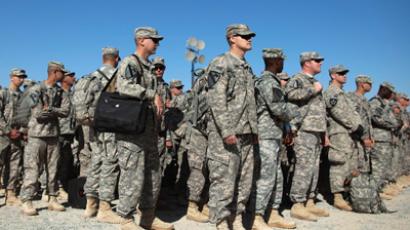Jeremy Scahill: Obama after whistleblowers worldwide
The United States encourages the Freedom of the Press both in America and abroad — at least they claim. But in actuality, the Obama administration is going out of their way to keep journalists from exposing the truth.
US President Barack Obama claims he runs an administration hell-bent on being transparent and open. At the same time, however, the commander-in-chief has condemned WikiLeaks contributor Bradley Manning for allegedly aiding the enemy by revealing the truth behind America’s war in Iraq. Now it has been divulged that Obama even appealed with the president of Yemen to ensure that one of their own journalists would stay behind bars for telling the truth.Journalist Jeremy Scahill tells RT that Yemeni reporter Abdulelah Haider Shaye was instrumental in exposing the falsities of a covert war in Yemen. In December 2009, Scahill says the press reported that a Yemeni strike had killed 34 members of al-Qaeda. When Shaye went to investigate though, he soon learned through spending time on the ground that the US was actually directly involved in the attack — an attack which took the lives of civilians. “They were concerned that this was a guy who was telling al-Qaeda’s side of the story and they wanted it shut down,” says Scahill.Shaye was eventually put on trial for exposing the truth behind the event and allegedly the court introduced false evidence, which in the end yielded a conviction that potentially carried a death sentence. But since the entire case against the journalist was fabricated by his government, the journalist got off with a relatively mild sentence of just five years. Under pressure, Yemeni President Saleh intended to pardon Shaye. This is when he got a call from President Obama himself, personally requesting that Saleh switch his stance on pardoning the reporter. “He is in prison because Barack Obama wants him in prison,” Scahill tells RT. Although Shaye remains largely unrecognized by western reporters, Scahill says it was his work that served as a smoking gun behind one of the biggest cover-ups of the Obama administration, saying that “his journalism, if anything, is the number one reason why we know anything at all about al-Qaeda in the Arabian Peninsula.” Even if his identity is largely unknown though, says Scahill, the unfortunate consequences are something any war reporter will try to avoid.“I think a lot of journalists are afraid to speak out on behalf of someone who has been accused of being pro-al-Qaeda or an al-Qaeda spokesperson,” he claims. The writer adds that the case of Shaye may be an extreme one, but that doesn’t mean it will happen again.“What I am more concerned about,” says Scahill, is “in this culture where this administration is going after whistleblowers in an unprecedented way, we all have an obligation to protect our sources. Myself, I’m really nervous about the safety of some of the people that I talk to.”“This administration seems intent on going after whistleblowers,” adds Scahill, who continues that as a journalist that covers national security issues, he often deals with government insiders that disclose details that otherwise would not escape the Pentagon. Incidents such as the imprisonment of Shaye and Manning, however, ended up sending “shockwaves through the community.”In Yemen, where Shaye broke the truth behind the 2009 airstrike, Scahill says the mood has changed entirely for reporters there who are now terrified to talk the truth. With Obama extending his influence all the way to Yemeni journalists, Scahill says soon others may have to worry.“The message there is that there sort of good terrorists and bad terrorists, and if you’re a former official of the Democratic or Republican Party, you’re allowed to advocate for people that are State Department-designated terrorists,” says Scahill. “But if you’re a journalist, you’re not allowed to interview them. That is chilling.”Scahill adds that even if the Obama administration believes persecuting whistleblowers will bring a victory for their covert wars, it ultimately hurts America’s counterterrorism efforts. “You need to understand the mentality of the people you claim to be fighting or you’re never going to be able to address the problem you say you’re fighting to wipe out,” says the journalist. “Even if you accept the framework of this global so-called ‘war on terror,’ you have just taken away one of your best opportunities to get intelligence on the ground” by jailing reporters.














